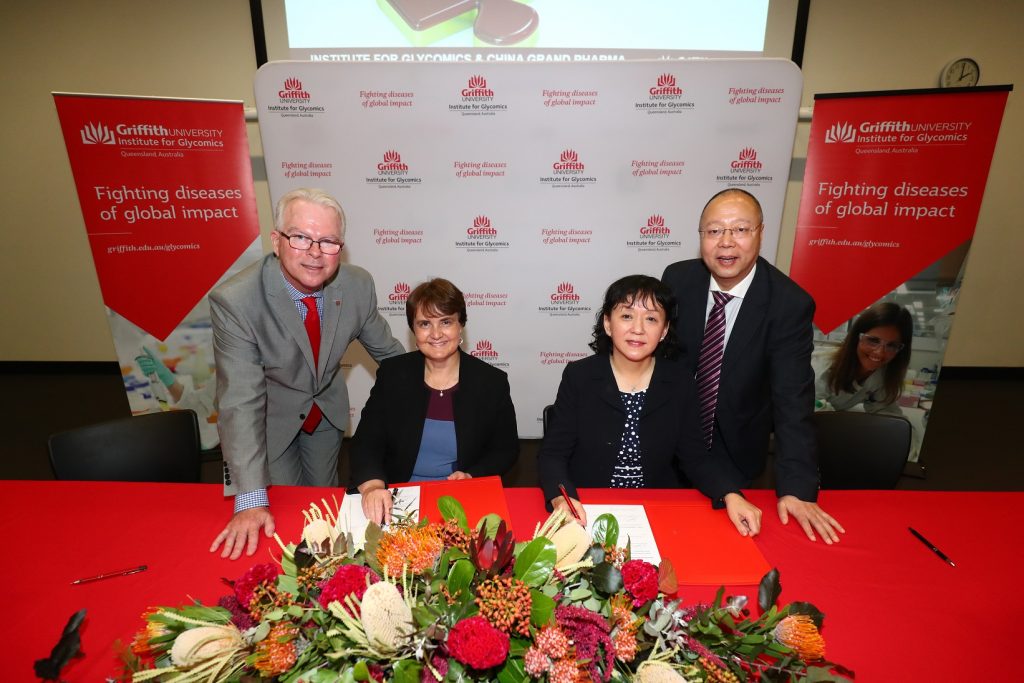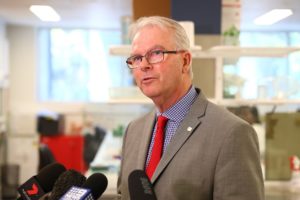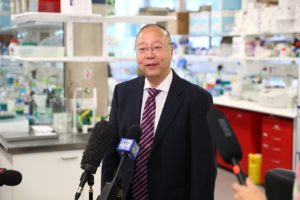
Griffith University‘s Institute for Glycomics has partnered with Hong Kong listed China Grand Pharma’s newly established Australian company Grand Medical Ltd to develop a new drug for Human Parainfluenza Virus.
Human parainfluenza virus (hPIV) commonly causes upper and lower respiratory illnesses in infants, young children, the elderly, and people with weakened immune systems, including transplant patients, however anyone can get infected. Symptoms of severe lower respiratory illness can include bronchitis, bronchiolitis, croup and pneumonia.

Respiratory tract infections remain the deadliest communicable diseases worldwide, causing more than 3.2 million deaths in 2015 alone. Yet antiviral drugs that target these viruses are drastically underrepresented in the pharmaceutical market. There is currently no therapeutic available to specifically treat hPIV infection.
Professor Mark von Itzstein AO, Director of the Institute for Glycomics and leader of the research team that discovered the world’s first drug for Influenza, Relenza, is the lead researcher and co-inventor of this new scientific discovery.

For over a decade we have built strong scientific expertise and a robust suite of potent lead molecules against hPIV. This significant co-development program with China Grand Pharma, to deliver a new drug to treat hPIV, represents a significant milestone for my team and project leaders Drs Guillon, El-Deeb and Dirr.
The hPIV program is supported by the iCAIR (International Consortium for Anti-Infective Research) platform, upon which the Institute for Glycomics is developing new tools to fight infectious diseases like hPIV, with its international partners, said Professor von Itzstein AO.
Griffith University signed the exclusive license and co-development agreement with China Grand Pharma to co-develop and commercialise the human parainfluenza drug candidate globally. The deal comprises significant upfront Research & Development and license fees plus development and sales milestone fees with a tiered royalty on product sales.
The Institute’s General Manager and Chair of Ausbiotech Ltd Queensland branch, Dr Chris Davis, led the Institute’s Business team in commercialisation negotiations with China Grand Pharma.
We are extremely pleased to finalise this significant commercial agreement with China Grand Pharma that will develop the world’s first small molecule drug to treat the diseases caused by hPIV.
“This multimillion-dollar agreement represents Australia’s largest preclinical stage university engagement with Grand Pharma to discover a novel antiviral drug and reflects our strong scientific team and IP portfolio.”
China Grand Pharma consider this translational research program a significant step in building their drug discovery pipeline. We are delighted to partner with the Institute for Glycomics to develop and commercialise this promising new technology, said Michael Wang, Vice President of China Grand Pharma.

We believe that combining the Institute’s unique platform with our capabilities in the pharmaceutical and healthcare sector will allow for the rapid and effective development of new therapeutics to combat this deadly virus and contribute to better global health, said Wang.
Griffith University’s Vice Chancellor and President, Professor Carolyn Evans welcomed the co-agreement and congratulated all those involved.
With neither an hPIV treatment nor vaccine currently on the market, there is a clear unmet clinical need and market opportunity for an hPIV therapy; thus, this licensing agreement and co-development deal is incredibly exciting and raises hope for millions around the global, said Professor Evans.

This is a major licensing deal for Griffith University and a wonderful outcome for the Institute for Glycomics, the researchers involved, and China Grand Pharma. It’s a perfect example of the Institute’s pioneering research and its commitment to translating and commercialising its research into tangible benefits for the global community, said Professor Evans.
China Grand Pharma has made major investments in several international companies including an Australian company Sirtex Medical Pty Ltd, German company Cardionovum GmbH and Canadian company Conavi Medical Inc.



![[BIOVOX] eTheRNA and China Grand Pharma enter a strategic collaboration in the Greater China Region focussed on eTheRNA’s proprietary mRNA development products and manufacturing capabilities](https://www.grandpharm.com/assets/uploads/2023/10/Medical-Technology-Innovations.png)
![[Endovascular Today] Sirtex Medical’s SIR-Spheres Y-90 ResinMicrospheres Approved in China](https://www.grandpharm.com/assets/uploads/2023/06/1-2-1024x461.jpg)
![[OncLive] Leveraging SIR-Spheres® Y-90 Resin Microspheres from Sirtex Medical to Improve Outcomes in Metastatic CRC](https://www.grandpharm.com/assets/uploads/2023/08/del_img03.png)